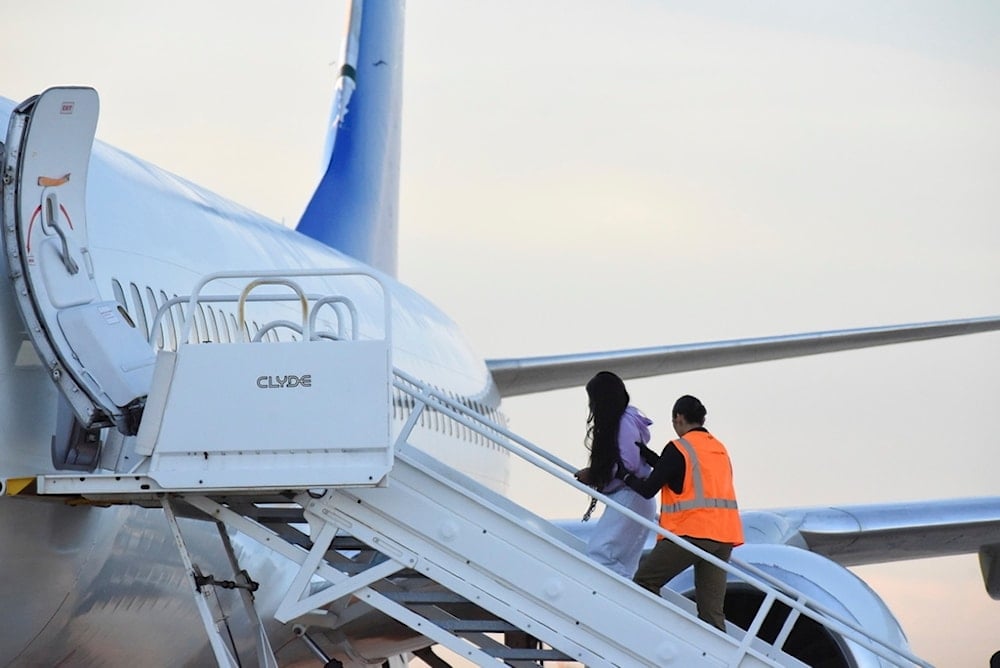Iran condemns US deportation of 120 nationals under Trump crackdown
Iran condemned the US deportation of 120 nationals under Trump's immigration crackdown as a politically motivated act of discrimination, accusing Washington of violating human rights and targeting Iranian citizens amid escalating tensions.
-

[For illustration purposes] - Venezuelan migrants board a plane heading back to their home country from Harlingen, Texas, on Wednesday, Oct. 18, 2023 (AP Photo/Valerie Gonzalez, File)
A senior Iranian official confirmed Tuesday that 120 Iranian citizens are being repatriated from the United States as part of President Donald Trump's mass deportation campaign, a move Tehran denounced as discriminatory, politically motivated, and a violation of international human rights law.
Hossein Noushabadi, the Parliamentary Director General of Iran's Foreign Ministry, said in remarks to local media that the group, many of whom reportedly entered the US through Mexico, will arrive in Iran within the next two days via Qatar. He revealed that the US Immigration Service has plans to expel roughly 400 Iranians, describing the operation as part of Washington's "anti-immigrant approach."
"The US Immigration Service is planning to expel about 400 Iranians currently living in the United States, most of whom entered illegally, in light of the new approach of the US government, which has an anti-immigrant approach," Noushabadi said.
According to Iranian officials, the deportations, carried out aboard US-chartered flights via third countries, mark the largest mass expulsion of Iranian nationals in decades. Some of those deported were held in US detention centers for months, while others were reportedly coerced into "voluntary return" after being denied asylum or residency rights.
Tehran says that several of the deportees possessed valid residence permits yet were inexplicably added to removal lists by US immigration authorities. "Some of those facing deportation also had residence permits, but for reasons stated by the US Immigration Service, they decided to include them on the list," Noushabadi noted.
He added that Iran has demanded Washington uphold international obligations, including the Universal Declaration of Human Rights, ensuring fair hearings and access to consular services.
"The US should not deprive them of appropriate consular services and the right to a fair trial and the principles enshrined in the Declaration of Human Rights," he said.
Political Hostility
Iran's Foreign Ministry has framed the deportations as part of a broader pattern of US hostility toward Iranian nationals, entrenched in Trump's anti-Muslim and anti-immigrant policies. The move follows years of discriminatory measures, from the "Muslim ban" targeting travelers from Iran and other Muslim-majority nations, to expanded visa denials for students and professionals.
Officials in Tehran argue that such actions expose the hypocrisy of Washington's human rights rhetoric, as Iranian migrants are stripped of due process and denied protection under international law.
Noushabadi affirmed that all deported citizens will be welcomed home without restriction, stressing that their rights remain intact.
"As Iranian citizens who left the country legally, they face no restrictions on returning to their homeland. We provide appropriate consular services to citizens who are returning to their homeland," he added.
Trump's Policy Under Fire
Trump has defended his immigration crackdown as an effort to "restore law and order," but rights groups have denounced it as a politically charged campaign aimed at appeasing his nationalist base. His administration's sweeping operations have disproportionately targeted immigrants from Muslim and developing countries, while dismantling asylum pathways and narrowing visa categories.
The latest expulsions of Iranians come amid heightened US-Iran tensions, raising concerns that Washington is using immigration enforcement as a tool of political coercion. Analysts note that deporting Iranian nationals, including those with legal residency, undermines diplomatic norms, especially given the absence of formal consular relations between the two nations.
International observers have also warned that forced returns may endanger individuals who sought refuge from persecution or economic hardship, and that collective deportations violate the principle of non-refoulement under international law.
Iran's Response
Tehran has pledged to facilitate the safe return and reintegration of its citizens while monitoring US actions through diplomatic channels. Officials reiterated that Iran will not tolerate discriminatory treatment of its nationals abroad, and that Washington must be held accountable for violating immigrant rights.
The mass deportation of Iranians, Iranian officials argue, symbolizes a broader moral and political failure within US policy, one that conflates migration with criminality and punishes citizens of nations unwilling to submit to American pressure.
Read more: US TPS lift targets Syrian migrants; Syrian flag raised on DC embassy

 4 Min Read
4 Min Read










